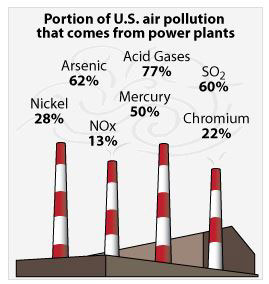As you know, last week the Supreme Court made some historic decisions on the Affordable Care Act, housing fairness and gay rights, but now they are back to business as usual, supporting corporations rather than people.
In National Mining Association versus EPA – guess who won? In a 5-4 decision, conservative judges ruled that EPA didn’t consider the costs to corporations before requiring power plants to cut emissions of mercury, arsenic, lead, acid gases and other toxic pollutants.
EPA’s Mercury and Air Toxics Standard (MATS), which has been in effect since 2012, lowers mercury emissions 90% by requiring the dirtiest power plants to install pollution prevention technology.
Imagine that! Power plants are the ONLY sector that isn’t required to have ANY pollution control equipment. No wonder there’s air pollution.

credit: EPA
Congress directed EPA to regulate these pollutants way back in 1990 under Clean Air Act amendments, but special interests managed to delay them for more than 20 years. Here they go again.
The good news about the decision is that power plants are far along in complying with it. Coal plants have either closed by now or are planning to close, or are installing equipment.
But the coal industry and 21 states with Republican majorities – where the oldest, dirtiest power plants are – sued anyway, saying, like they always do, that they are the most expensive rules ever. EPA estimates the rules will cost $9.6 billion, but save $37-90 billion by preventing premature deaths and health care costs associated toxic air pollutants.
It’s not that EPA didn’t consider the costs to industry, it didn’t do it in the right order, claim the plaintiffs. But EPA always calculates the costs after deciding whether to regulate a pollutant. Why would you do it the other way around?
Ironically, this actually puts EPA in a better situation in the next lawsuit – which will try to prevent regulations on power plant greenhouse gas emissions. Plaintiffs’ main argument to the Supreme Court was that EPA shouldn’t be allowed to regulate greenhouse gases on the one hand, and air pollutants on the other – a double whammy. Well, air pollutants are off the table for now.
And Red States can continue enjoying their air pollution.
